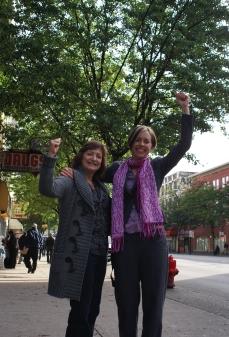BC sex workers will be allowed to return to the province’s Supreme Court to challenge Canada’s prostitution laws, the BC Court of Appeal ruled on Oct 12.
The decision comes two weeks after an Ontario Superior Court judge ruled that three sections of the Criminal Code dealing with prostitution are unconstitutional.
In that case, Justice Susan Himel found Canada’s prostitution laws are harming the people they’re meant to protect.
And, she added, “the danger faced by prostitutes greatly outweighs any harm which may be faced by the public.”
The federal government plans to appeal the Ontario decision.
The 2-1 BC decision does not overturn the laws on prostitution, as the Ontario decision will if it survives its appeal.
Rather, the BC decision allows former sex worker Sheryl Kiselbach and a group of sex workers from Vancouver’s Downtown Eastside called Sex Workers United Against Violence (SWUAVS) to challenge the laws as they had originally wanted to.
That original intent was thwarted in December 2008 when BC Supreme Court Justice William Ehrcke ruled that neither SWUAVS nor Kiselbach could bring the case since they had not been charged with any of the offences – a standard precursor to a constitutional challenge.
Kiselbach and SWUAVS appealed Ehrcke’s decision.
Lawyer Joe Arvay argued Kiselbach should be able to bring the case to court since she spent several decades as a sex worker, though she is not in the trade now.
Two out of three judges on the BC Court of Appeal panel who heard the case agreed.
Kiselbach called today’s appeal decision a victory.
“I could not believe that after 30 years of involvement in sex work, including criminal convictions, the government was arguing that I was not entitled to challenge the prostitution laws,” she says. “I am glad I will now be able to proceed with the case because I have the safety and support to do it now. It would have been impossible for me to take on this case while I was actively involved in sex work.”
After reading the ruling, Arvay shouted “Wahoo” and dashed off down a hallway.
He had argued in January that while prostitution itself is legal in Canada, laws prohibiting communicating for the purpose of prostitution, operating a bawdyhouse and living off the avails of prostitution put women at risk.
Arvay told justices Harvey Groberman, Mary Saunders and Kathryn Neilson that if sex workers can’t communicate in public, they move indoors, which puts the bawdyhouse rules in effect. If they try to work with a helper, the avails and procuring law kicks in, he added.
Ehrcke wanted marginalized, criminalized sex workers to appear in court and testify. Arvay and Pivot Legal Society lawyer Katrina Pacey argued that was just not feasible.
Saunders wrote the decision with Neilson concurring.
“I respectfully conclude the judge failed to give sufficient weight to the breadth of the constitutional challenge and the comprehensive and systemic nature of the plaintiffs’ theory,” Saunders wrote. “The balance struck by the jurisprudence is between judicial economy and openness to court review of seriously challenged legislation.
“In my respectful view… the claim in total is met and the balance tips toward access to court review of the impugned legislation,” Saunders wrote.
Ehrcke’s ruling, in not considering the systemic scope of the case, stripped the case of its “central thesis,” she added.
Groberman dissented. “The case before us does not include any challenges that cannot be properly advanced in an appropriate case where there is private interest standing,” he wrote.
Pacey says the decision widens access to justice for marginalized people who might not be capable of bringing a case on their own.
She called it a victory for equality before the law.
Federal Department of Justice spokesperson Lyse Cantin says it’s too early to say if the decision will be appealed to the Supreme Court of Canada.
“We’re looking at the decision now,” she says. “I think we have 60 days to do that.”

 Why you can trust Xtra
Why you can trust Xtra


